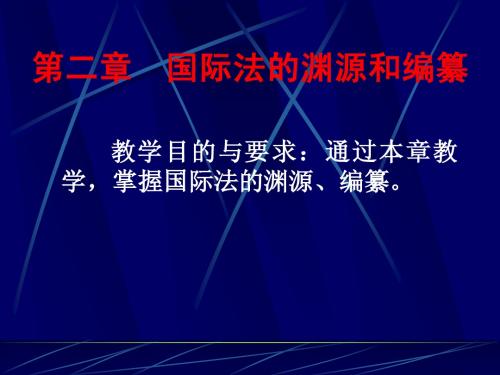第2章 国际法的渊源和编纂
第二章 国际法的渊源和编撰

二、国际法渊源的基本内容
(一)国际条约international
conventions (二)国际习惯international custom (三)一般法律原则the general principles (四)确定法律原则的辅助资料judicial decisions and the teachings of the most highly qualified publicists of various nations (五)国际组织和国际会议的决议the decisions of international
(二)国际法的官方编纂 19世纪以来,一些重要的外交会议开始了 19世纪以来,一些重要的外交会议开始了 官方的国际法编纂工作。 国际联盟成立后,进行过国际法编纂工作。 但总的来说,国联在国际法的编纂方面成 效并不显著。 二战结束后,国际法的编纂工作主要是在 联合国的主持下进行的。
联合国国际法委员会
三、国际法编纂的历史 (一) 民间编纂 最早提出国际法编纂的是18世纪英国学者 最早提出国际法编纂的是18世纪英国学者 边沁(Bentham),他主张把现行的国际习 边沁(Bentham),他主张把现行的国际习 惯规则制定成一部法典,并把争议之点制 成法律。随后,一些民间团体和学者开始 国际法编纂的尝试。
(一)国际条约
(1)“契约性条约”是指为缔约国之间规定 契约性条约” 具体权利义务的条约,如通商航海条约、 互助合作条约等。 (2)“造法性条约”是指对国际法的原则、 造法性条约” 规则和规章制度起到创立、修订或补充作 用的条约。如《联合国海洋法公约》 用的条约条约
1、概念:国际条约是两个以上的国际法主体 依据国际法缔结的,确定相互间权利义务 关系的书面协议。 一般而言,凡是符合国际法,对缔约国有拘 束力的条约都可以视为国际法的渊源。 2、分类:有的学者根据条约的性质,把条约 分为“契约性条约” 分为“契约性条约”和“造法性条约”。 造法性条约”
国际法课件第二章国际法的渊源和编纂

例:下列哪些选项属于国际法的渊源?( 下列哪些选项属于国际法的渊源?( ) 国际条约(最主要的渊源) A.国际条约(最主要的渊源) 国际习惯(最早的渊源) B.国际习惯(最早的渊源) C.一般法律原则 D.国际法院、其他国际私法机构、仲裁机构的判例及各国 国际法院、其他国际私法机构、 国内判例 E.各国权威最高之公法学家的学说 F.国际组织的决议
各国法律体系共有的原则国际法渊源国际组织的会议辅助资料司法判例各国权威国际法学家学说一国际法渊源的概念对国际法渊源的理解在理论界尚非一致
第二章
国际法的渊源和编纂
教学目的与要求: 教学目的与要求 : 通过本章教 掌握国际法的渊源、编纂。 学,掌握国际法的渊源、编纂。
.
有权利便有救济。 有权利便有救济。 拉
Where there is a right, there is a remedy.
独立渊源 独立渊源 国际法渊源 辅助资料
条约 国际习惯:客观要素(惯行) 主观要素(法律确信) 国际习惯:客观要素(惯行)、主观要素(法律确信) 一般法律原则: 一般法律原则:各国法律体系共有的原则 国际组织的会议 司法判例 各国权威国际法学家学说
国际法的编纂是指国际法的法典化,即把现有的国际法原则、规则和制度 国际法的编纂是指国际法的法典化,即把现有的国际法原则、 编成系统的法典。编纂有两种形式:一是全面的编纂;二是部门法的编纂。 编成系统的法典。编纂有两种形式:一是全面的编纂;二是部门法的编纂。国际 法的编纂始于18世纪。20世纪以前 主要是个人、 18世纪 世纪以前, 法的编纂始于18世纪。20世纪以前,主要是个人、学术团体和国际外交会议进行 编纂。20世纪国际联盟成立以后 才开始由国际组织进行国际法编纂。 世纪国际联盟成立以后, 编纂。20世纪国际联盟成立以后,才开始由国际组织进行国际法编纂。
国际公法第二章 国际法的渊源与编纂

第二节国际法的编纂
一、 概述 国际法的编纂(codification of international law),又称国际法的法典化,即将国际 法的规则以类似法典的形式使之明确化和 系统化。 国际法的编纂从严格意义上讲,是指对现 有国际法规则的法典化。 国际法的法典化还可分为全面法典化和分 类法典化。
国际习惯的特征:
1、通常不是一个自觉的造法过程。“不 自觉、无意识的造法”(凯尔森) 2、习惯国际法规则通常对于国际共同体 的所有成员都具有约束力。
四、一般法律原则
一般法律原则(general principles of law) 在国际法的渊源中,也是争论颇多的一个 问题。 一般法律原则指的是什么?是国内法理的 一般原则? 国内法里的证据程序和管辖权方面。
(3) 无法适用上述法律时,适用本法院从 世界各法系的国内法,包括适当时从通常对 该犯罪行使管辖权的国家的国内法中得出的 一般法律原则,但这些原则不得违反本规约、 国际法和国际承认的规范和标准。 2.本法院可以适用其以前的裁判所阐释的法 律原则和规则。
3.依照本条适用和解释法律,必须符合国际 承认的人权,而且不得根据第7条第3款所界 定的性别、年龄、种族、肤色、语言、宗教 或信仰政见或其他见解、民族本源、族裔、 社会出身、财富、出生或其他身份等作出任 何不利区别。
duration,consistency, repetition and generality
(2)心理要件,即法律确信(opinio juris)。即存在的通例已被各国接受为法 律。
习惯的要素:
1、实践的持续性
2、做法的一致性、连贯性
3、做法的一般性
4、法律及必要的确念
Although the passage of only a short period of time is not necessarily, or of itself, a bar to the formation of a new rule of customary international law on the basis of what was originally a purely conventional rule, an indispensable requirement would be that within the period in question, short though it might be, State practice, including that of States whose interests are specially affected, should have been both extensive and virtually uniform in the sense of the provision invoked;
国际法的渊源和编纂.ppt

(寅)一般法律原则(general principles of law)为文明各国所 承认者。
(卯)在第59条规定之下,司法判例及各国权威最高之公法家学 说,作为确定法律原则的补助资料者。(as subsidiary means for the determination of rules of law)
严格法律意义上的国际法渊源
国际习惯必须具备的两个要件
(一)物质因素,即在某一方面国家实践实际上一 致而且参加实践的国家广泛而有代表性,包括 了最有利害关系的国家.
(二) 心理因素,即法律确信(opinio juris),是 指这种实践是基于对于一项法律规则或法律 义务的一般承认(a general recognition).
the determination of the rules of law)
1、司法判例(judiຫໍສະໝຸດ ial decisions) 2、国际法学(teachings) 3、重要国际组织的决议(resolutions)
第二节 国际法的编纂
国际法编纂的含义 国际法编纂(codification),一般是指把国际法 或国际法某一部门的规则(包括国际习惯和 条约的规则),以类似法典的形式,更精确、 系统地制定出来。
广泛历史意识的国际法渊源
一般法律原则(general principles of law) 一般法律原则是各国法律体系所共有的原则,
即众多文明国家共同适用的国内法原则。 一般法律原则在裁判中通常被作为补充渊源适
《国际法》第二章 第一节:国际法渊源的含义

第二章国际法的渊源和编纂第一段视频:国际法渊源的含义同学们好,本章我们讲授的内容是国际法的渊源和编纂,首先这一小段讨论的是国际法渊源的含义一提起渊源,人们脑海中就会想到源头,不错,渊源通常泛指事物的根源,它并不是专门的法律术语。
但是,当人们将这个词语借用在国际法领域的时候,情况就比较复杂,一般说,法律的渊源包括历史渊源、理论或思想渊源、本质渊源、效力渊源等等,所以,从这个意义上说,国际法的渊源问题,是国际法理论中一个争议较大的问题。
我们认为,国际法渊源可以分为实质渊源和形式渊源两个部分。
实质渊源是指,在国际法规范形成过程中对其内容产生直接或者间接实际影响的各种因素。
它着重从效力的角度去谈。
它们广泛涉及到政治、经济、文化、思想观念、伦理、哲学等各个方面,是法律规范生存与发展的基础或者深层次原因。
所以,实质渊源的含义溢出了法学领域,除国际法必须做出相应研究外,同时也是包括法社会学、法哲学等在内的其他相关学科的重要研究范围。
英国著名的国际法学者布朗利认为,实质渊源是为国际法规则的存在提供证据,也就是说,一旦被证实,就具有一般适用的法律约束力规则的地位。
它们是国家间有关特定规则或者做法的合意存在的极为重要的证据,这里的合意,强调的是国家之间在这个事项上的一致。
国际法院判决、联合国大会决议和“造法性”多边条约是各个国家对特定规则的态度以及合意存在与否的真正的实质证据。
长期在国际法院书记处工作的胡舍伟则认为,在某一个规则被宣称成为国际法律规则的情况下,实质渊源便是指这一个规则最初出现的地方,常常是某种法律文件,或者是一个条约、联大决议、国际法委员会议案、司法判决,或者是某个研究机构报告,甚至某个教科书中的陈述。
在确定某一个实质渊源时,并不需要它被法律当局以法律文本的形式予以确认:例如来说,某一个条约可能从来没有生效过,也就从未以条约的形式对任何国家产生过法律约束力,但它仍然可能成为某一个规则的实质渊源,只要这一原则从其他渠道获得了法律的约束力。
第二讲 国际法的渊源

(三)对《国际法院规约》第38条 第l款之理解:“法院对于陈诉各项争 端,应依国际法裁判之,裁判时应适 用:(1)不论普遍或特别国际条约,确 立诉讼当事国明白承认之规条者。(2) 国际习惯,作为通例之证明而经接受 为法律者。(3)一般法律原则为文明各 国所承认者。(4)司法判例及各国权威 最高之公法学家学说作为确定法律原 则之补助资料者。”
(二)国际条约之分类——契约性条约 (contractual treaties)和造法性条约(1awmaking treaties)
1 、契约性条约与造法性条约的区别?
契约性条约:两个或少数几个国家间就 某些特定事项明确彼此权利义务关系的条约。 造法性条约:为数众多的国家共同签订 的以创设或变更一般国际法原则、规则和制 度为目的的普遍性国际条约。
B 、沉默在国际法上的意义
பைடு நூலகம்
( A)肯定说 王铁崖:“惯例需要国家参加或为国家所接受。参加或接受有 直接的和间接的……间接的参加或接受则意味着国家的不行为,从不 行为中间接表示国家的立场和态度。行为和不行为都是默认的内容, 前者是积极的默认,而后者则是消极的默认。” 理由: A) 国家在国际社会中也应符合“理性人”(reasonable person/state))的条件,国家有义务知晓法律的形成,受到不利影响 的国家,有提出异议的义务 B)国际社会的需要-----为了国际社会的存在,有必要促进习惯 国际法的诞生 (B)否定说 童金(Tonkin): 一般习惯法规则只能拘束表示了明确同意的国家, 而不能拘束未表示这种意思的国家,沉默不能被推定为同意的意思。 理由: A)习惯国际法的形成过程并不透明,对国家做“理性人”假设并 不符合国际社会实际。 B)沉默既可以暗示默示同意,也可以只是表示对有关问题缺乏 兴趣或缺乏了解。 C)国际社会的需要只是一种功利主义考虑,并无充分理论基础。
第二章 国际法的渊源和编纂.

三、严格法律意义上的 国际法渊源(续)
(二)国际习惯。 国际习惯是指被各国接受为法律的国际实践或通例, 也就是在国际实践中形成的国际法原则和规则。国 际习惯,作为国际法的渊源,早在条约以前就已经 存在。 国际习惯形成有两个要件:必须有国际的实践或通 例,即国家间长期的、反复的、广泛的、一致的作 为或不作为。这称为“物质因素”。另一个条件这 样的通例被国家接受为法律,即具有法律拘束力, 这称为心理因素。见案例:“庇护权案”。 这两方面的因素已经同时一致具备的情况下,某项 具有法律约束力的国际习惯才被正式确立起来。
三、联合国国际法委员会 及其编纂活动(续)
(二)国际法委员会的编纂程序 委员会规约为“逐渐发展”和“编纂”分别规定了 两种不同的程序和工作方式。但都有一个共同点: 都要求把委员会草拟的条款草案直接提交各国政府 作出评论,同时,联合国大会第六委员会(法律委 员会)也要就草案和一些根本法律概念进行评论。 国际法委员会在1949年第一届会议上,曾通过一个 14个问题的编纂表。此表后来构成委员会长期工作 计划的基础。在此基础上,共有49个议题列入国际 法委员会的工作计划,涉及国际法渊源、主体、国 家继承、国家管辖与豁免、国际组织法、个人在国 际法中的地位、国际刑法、海洋法与空间法、国际 关系法、争端的解决等领域。
前者主要是包括各主要国家在内的多数国家参加的普遍性条约从条约的内容看主要是有关确立或更改一般国际行为规范的所谓造法性条约后者主要是两个以上少数国家缔结的条约是就特定事项规定缔约国间具体权利义务的契约性条约
第二章 国际法的渊源和编纂
第一节 国际法的渊源
一、国际法渊源的含义 二《国际法院规约》第38条与国际法渊 源的类别性 三、严格法律意义上的国际法渊源 四、广泛意义上的国际法渊源
第02章 国际法渊源与编纂

4.证明
→ 国家法律法规、外交文件、政府官员讲话、国际 和国内法院的判决、国际组织的决议
四、一般法律原则: 补充渊源 五、国际组织的决定和决议 → 辅助资料 六、国际司法判例 → 辅助资料 参考书: 李浩培:国际法的概念和渊源, 贵州人民出版社,1994
第二节 国际法的编纂
(Codification of International Law)
一、概述 → 法典化 → 国际法的逐渐发展 → 官方的、个别的、全球性编纂 二、性质 → 官方的、个别的、全球性的编纂 三、意义 → 法典化 → 制订新法律,并促进其发展
四、联合国与国际法的编纂
1. 国际法委员会(ILC)
国家和政府的承认与继承→ 国家及其财产豁 免→ 海洋法→ 国籍→ 外国人的待遇→ 外交领 事关系与豁免→ 条约→ 最惠国条款→ 国际水 道的非航行用途→ 国际刑员会(人权理事会)→ 大会第 六委员会
五、其他国际组织的编纂
→ 国际红十字会
二、国际条约: 主要渊源
缔约国数量
双边条约 多边条约
性质
契约性条约(Traité-Contrat) 造法性条约(law-making treaties)
三、国际习惯: 主要渊源
1.概念 → 各国重复类似的行为而具有法律拘束力的 惯例
物质因素(material element):实践 心理因素(psychological element) ~法律确信 2.构成 2. (opinio juris) 持续时间:“即时”习惯法(instant custormary law):郑斌 3.通例(general practice)-惯例与习惯
第二章 国际法渊源与编纂
第一节
国际法的渊源
Law) (Sources of International Law)
第二节:国际法的渊源

第二节:国际法的渊源一.定义:•“渊源”是指法律体系在技术层面运作的规定。
那种作为理性或道德的最终渊源不包括在内;那些更加功能性的渊源,例如图书和杂志,也不包括在内。
•渊源大致可以分为形式渊源和实质渊源二.国际法的主要渊源:•国际条约•国际习惯•一般法律原则•确定法律原则的辅助方法(司法判例或公法家学说)•国际组织的决议•《国际法院规约》第三十八条:一、法院对于陈诉各项争端,应依国际法裁判之,裁判时应适用:(子)不论普通或特别国际协约,确立诉讼当事国明白承认之规条者。
(丑)国际习惯,作为通例之证明而经接受为法律者。
(寅)一般法律原则为文明各国所承认者。
(卯)在第五十九条规定之下,司法判例及各国权威最高之公法学家学说,作为确定法律原则之补助资料者。
二、前项规定不妨碍法院经当事国同意本“公允及善良”原则裁判案件之权。
三.习惯:1.习惯形成的两个条件:国家实践和主管确信2.两种倾向:一种是强调国家实践,另一种是强调主观确信3.习惯作为一个重要的国际法渊源在国际法中存在的意义:a)习惯是一个充满活力的创造过程;b)习惯具有普遍的适用性;c)“即时”习惯法的存在;d)习惯是“民主的”,反映了国际体系的特点;e)习惯的不精确性也意味着灵活和模糊;四.实质性事实:对国家特定实践的性质,需要考虑的因素包括:持续的时间、一致性、重复和一般性。
•案例一:国际法院1950年“庇护案”(the Asylum case):该案涉及的秘鲁人托雷发动政变失败,被秘鲁政府追捕。
哥伦比亚驻利马大使馆允许他进入使馆庇护,但秘鲁政府拒绝办法允许托雷离开该国的安全证件。
哥伦比亚将该问题提交国际法院。
国际法院宣称,习惯规则必须“与经过相关国家一贯并一致实践通过的惯例相符”。
但该案中,国家实践太不确定,而且是相互矛盾的,不能构成有权单方面确定相关罪行的“一贯并一致的惯例”。
•案例二:“英挪渔业”案(the Anglo-Norwegian Fisheries case)中,针对挪威测算领海宽度的方法,英国声称的习惯规则是,直线基线只可以划在从湾口的一端到另一端距离不到10英里处,作为测算领海的基线。
第2章 国际法的渊源和编纂

第二章国际法的渊源和编纂第一节国际法的渊源渊源的含义A.国际法渊源是指国际法作为有效法律规范所由形成的方式。
B.国际法渊源是指国际法规范第一次出现的地方严格意义上的法律渊源1.国际条约公约:covenant/convention协议:agreement/treaties/statute建议书:protocol条约是国际法主体间就权利义务关系缔结的一种书面协议两种:一般General conventions &特别Particular conventions(普通,几乎所有国家)(少数国家)↓↓造法性条约契约性条约Law-making treaties Treaty contracts(normative treaties)作为一般国际法渊源的条约只能是普遍性的造法条约:维也纳《外交关系公约》芝加哥《国际民用航空公约》即使是大多数国家参加的造法性条约,通常也只约束其缔约国,而对非缔约国无效.由少数国家参加的契约性条约,不能直接成为一般国际法的渊源2.国际习惯是各国在其实践中形成的一种有法律约束力的行为规则Custom in international law is a practice followed by those involved because they feel legally obliged to behave in such a way.To establish a rule of customary international law, it is necessary to demonstrate both a material element and a psychological element.物质因素Material element1.时间上较长的延续性DurationA.公海自由Freedom of sea;B.北海大陆架Continental shelf (NorthC.国际海底International seabed2.Consistency (continuity) and repetitione.g. 庇护权案Asylum case ( Columbia vs. Peru 195)a customary rule must be “in accordance with a constant and uniform usage practised by the States in question”But in Nicaragua vs. US (1984)3.普遍性GeneralityA. Major powers 国际政治对国际法的影响B. Relative importance of particular states during formation of a customary rule如领海国家荷兰西班牙葡萄牙心里因素Psychological element法律确信opinio jurisThe general practice must be one accepted as law and international tribunals will be require some evidence of opinio juris together with the proof of State practice.※Customary law and treaty law have equal authority although, if there is a conflict between the two, it is the treaty which prevails. Treaties should be interpreted to avoid such conflicts wherever possible.广泛意义上的国际法渊源1.The general principles of law2.Judicial decisions and the teachings学说3.Resolutions of int’l organizations (esp. UN)1.The general principles of lawto principles ofwhere treaties or use of principles of equity and has stated them to be an integral part of international law.e.g.Principle of estoppels ;good faithEquity2.Judicial decisions and the teachingsAlthough there is no stare decisis in international law, the ICJ does make use of its own earlier decisions and has also referred to decisions of higher municipal courts.Less express use has been made of publicists国际法学家, although States themselves will often make considerable use of them when arguing a particular position.3.Resolutions of int’l organizations(esp. U.N.): soft law重要国际组织的决议Three categories of UN resolutions:1.Decisions2.Resolutions3.declarationsSoft law ??It refers to the international instruments which, while not binding on States in the manner of treaty provisions, nonetheless constitute normative claims and provide standards or aspirations of behavior.第二节国际法的编纂国际法编纂codification,一般是把国际法或国际法某一部门的规则(包括国际习惯和条约的规则),以类似法典的形式,更精确、系统地制定出来History of codificationBentham: in 18th centuryInstitut de Droit International and International Law Association: from 1873Hague Peace Conference: in 1899 and 1907The International League: in 1930the UN: from 1947Other international organizations: ICRC联合国国际法委员会及其编纂活动(一)国际法委员会的组成及职能联合国国际法委员会,最初由15名委员组成,至1981年增加到34名,背景各异由联合国各会员国政府提名,经联合国大会选举职能:1.国际法的逐渐发展encouraging the progressive development of int’l law2.国际法的编纂codification(二)国际法委员会的编纂程序及成就Procedure1.The国际法委员会ILC initiates the draft articles.2.They are sent for comment.3. A conference may then be convened, at which the articles are discussed.4.After several discussion a finished convention may be produced, which can be opened forsignature.并不是所有联合国主持的公约都是国际法委员会拟定的,联合国其他机构或会议。
02第二章国际法的渊源(国际公法马工程教材)

13
(三) 国际习惯在法律确信方面的注意事项:P60 1.一贯反对者原则:习惯国际法对于一直反对该项规则的国
家没有约束力,体现了国际法的“自愿性”。
2.速成习惯国际法主张的利弊。 (四) 国际习惯的地位及其与条约的关系P60 习惯国际法的主要规则体现在国家主权及其领土完整、 国家及政府承认、同意、信实、公海自由、国际责任、 自卫等。 1.条约与习惯相互补充和配合。 2.习惯可以被编纂为条约。 3.条约可以作为习惯的证据。
12
二.联合国与国际法的编纂(P72-76) 1、联合国大会第六委员会即法律委员会 2、联大决议成立特别委员会,如国际贸易法委员会 3、主管的联合国专门机构 4、召开外交会议 5、联合国国际法委员会: 该委员会编纂国际法的程序是:向联合国大会提出选题或 由大会提出选题;由该委员会草拟公约草案或条款草 案,它们经该委员会三读通过,形成最终草案,提交 大会讨论通过。最后形成公约,开放给各国签字和批 准。
国际公法
Public International Law
国际法、万国法、万国公法 (International Law) (Law of nations)
Huaiyin Normal University
国际公法 HNU
第二章
国际法的渊源
第一节 国际法渊源的内涵与类别 第二节 国际法渊源的位阶与强行法
四、一般法律原则(P61) 对其含义有三种解释: (1)认为它是指国际法的一般原则,或者是国际法的 基本原则(实际上扩大了一般法律原则的范围,一般原 则和基本原则实际上是包含在条约和习惯中,而一般法 律原则不同与条约和习惯) (2)认为它是各国之间的“一般法律意识”所产生的 原则或所谓“文明国家的法律良知”所产生的原则。 (事实上,由于各国政治、经济、文化和历史不同,这 种法律意识很难产生) (3)认为它是各国法律体系所共有的原则,如劳特派 特、沃尔多克等。 现代国际法的流行的基本观点是第三项,如诚信原则、 禁止反言原则、一事不再理原则等等。
2第二章国际法的渊源与编纂

第二节 国际法的编纂
一概念与意义 1 国际法的编纂是指国际法的法典化,即把国际法的全部或一部分 的原则规则和制度系统地用类似法典的条文形式制订出来. 2 意义: 一种是把现有的国际法规法典化,即把分散的规则制订成为法典. 一种是不仅把现有的国际法规则进行法典化,而且还包括对正在 形成中的或不明确的规则进行整理和完善,即对国际法进行发展. 3 国际法编纂的类型-主要有两种 一种为民间的非官方编纂,它是由私人或学术团体进行 另一种为官方编纂或称为政府间编纂 即由国际外交会议或由政 府间国际组织进行编纂最后把编纂结果缔结为有拘束力的国际公 约. 二 国际法编纂的发展 1 边沁最早提出,一开始是由学术团体主持的民间编纂
3一般法律原则 1)一般法律原则是什么?其包括哪些内容? 2)一般法律原则能不能成为国际法渊源 4“公允及善良”原则的运用--经当事国同意 三 确定法律原则的辅助方法 1 包括司法判例.权威公法学家学说和国际组织的 决议 2 作用-本身并不是法律渊源,只是确定法律原则 的一种辅助方法
第四节 国际法的渊源
二 主要渊源 1国际条约-最主要的渊源 pacta sunt servanda 造法性国际条约-<维也纳会议最后议定书>p33<巴黎非战公 约><关于中国西藏地方和印度之间的通商和交通协定> 2 国际习惯-最古老,最原始的渊源 1)国际习惯和惯例的区别 2)国际习惯形成的两个因素 物质因素-各国重复类似行为 usus常例 主观因素-具有法律确信,opinio juris既各国都认为其有法律 拘束力 3)国际习惯的证据 a国家之间的外交关系,表现在条约宣言以及其他外交文书中 b国际组织和结构的实践,表现在国际组织和机关的决定或判决 c国家内部行为,表现于国内法规,法院判决行政命令等. “荷花号案”
国际私法第二章 国际私法的渊源

2.本案应适用何国的法律?
案例3:飞宇公司诉神屋公司国际海上船舶 碰撞侵权损害赔偿案
案例3:飞 宇公司诉神 屋公司国际 海上船舶碰 撞侵权损害
赔偿案
【案情简介】
1994年7月10日14时,利比里亚飞宇航运公司所属的 “飞宇”轮与巴拿马神屋海外经营公司所属的“延讯” 轮在中国黄海东部的公海海面上发生碰撞(两船均在 巴拿马登记注册),造成“飞宇”轮机舱进水沉没, “延讯”轮首部和左舷船尾受损。“延讯”轮碰撞后 撞到停在近旁的一艘中国渔船,致使该渔船沉没,2 人死亡。1996年1月11日,飞宇公司获悉“延讯”轮 抵达中国大连港,遂向大连海事法院提出扣船保全申 请。大连海事法院准予该申请,扣押了船舶,并于被 申请人向大连海事法院提供了300万美元担保后,解 除了扣押。1996年2月12日,飞宇公司向大连海事法 院提起诉讼,要求神屋公司赔偿损失。经调查,本案 碰撞中飞宇公司负有60%的过失,神屋公司负有40% 的过失。
白雪夕阳
【问题】1.中国法院有无管辖权? 2.本案原告起 诉是否已过诉讼时效? 3.本案准据法应如何确 定? 4.依照我国《海商法》,本案两船的损失 应如何承担? 5.假设在本案审理过程中,中国 渔船所有人向大连海事法院起诉神屋公司,要 求其全部承担渔船和人身损失。法院将两案合 并审理,按照我国《海商法》,神屋公司是否 应该全部承担渔船损失和人身死亡损失?
第二,在大陆法系国家,国际私法的主 要渊源是成文法 。
二、我国对司法判例的立场和态度
在我国现行法律体制下,判例不是 法律的渊源,它只对具体案件具有法律 约束力,不能作为法院处理其他案件的 法律依据。
在我国司法实践中,司法判例主 要通过三种方式发挥作用:
第一,最高人民法院总结我国涉外民事 审判的实践经验,对有关涉外民事关系 的立法或司法审判中出现的具体问题所 作出的“解答”、“批复”等指示性司 法解释,对法院和其他有关机关、个人 具有拘束力。
国际法课件第二章)-国际法的渊源

国际公法规范国家和国际组织之间的相互
典型案例?
2
关系,而国际私法规范私人之间的跨国交 易和争端解决。
国际公法的典型案例是国家之间的领土争
端、国与国之间的战争,而国际私法典型
案例是跨国婚姻、国际贸易合同等。
3
涉及范围?
国际公法涉及领土-国界、海洋-航空、大 气-环境等方面的问题,而国际私法则牵 扯到民事、商事、劳动、知识产权等领域 的问题。
维也纳国际会议中心
维也纳国际会议中心是联合国的最大总部之一,也
际法的创新与发展
1 面临的挑战?
人工智能、气候变化、态势感知等全球性挑 战对国际法的发展提出了新的要求。
2 国际法的发展重点?
在国际法的发展过程中,重点在于完善国际 法制度、增进国际法的普遍有效性和实施国 际法规则。
国际法的争议解决机制
作用
• 推动气候、人权、禁止武器扩散等全球问题 的解决。
• 为跨国企业和开展国际贸易提供法律保障。 • 保护公民和外国投资者的利益。
国际法与国家主权
1
基本原则?
国家主权是维护国际法的前提,而国际法则是制约国家主权的限制条件。
2
冲突解决?
当国际法与国家主权发生冲突时,应该依据国际法的原则和规则进行解决。
公法学的兴起
18世纪,瓦特尔的著作《国际法原理》为公法学的 兴起发挥了重要作用。
国际民主化进程
国际法的进一步发展和国际民主化进程在1919年巴 黎和会上得到了充分的体现。
联合国的成立
联合国成立后,以和平为目标,为国际法的发展提 供了更为广泛的平台。
国际法源泉
习惯国际法
广泛存在于国家实践中的行为,构成习惯法的 要素包括长期、广泛、经常等。
第二章 国际法的渊源和编纂

为证明某项规则已确立为国际习惯,必须查找充分证据。
下列关于国际习惯的说法正确的是( )。 A.国际习惯是某一个国家长期形成的做法的总称 B.国际习惯曾经是国际法最古老、最原始的渊源, 但在现代国际法中它已被国际条约所取代 C.国际习惯形成的证据,可见之于国家的对外文件、 国内外司法判决、国际组织的决议等 D.国际习惯、国际惯例与通例是可以相互替代的。
第二章 国际法的渊源和 编纂
第一节 国际法的渊源
一、国际法渊源的含义 渊源(sources)-表现形式 国际法渊源两种解释:
பைடு நூலகம்
国际法作为有效法律规范所形成的方式(严格意义) 国际法规范首次出现的地方(广义)
二、国际法的渊源 1.严格意义上的国际法渊源
(1)国际条约 一般国际条约:普遍性、造法条约 特别国际条约:少数国家缔结、契约性条约 (2)国际习惯 物质因素:通例的存在 (P33) 心理因素:存在的通例已被各国接受为法律
国际人道法中的区分对象原则(区分战斗员与平 民是一项已确立的国际习惯法原则),也体现在 《1977年日内瓦四公约第一附加议定书》中。 甲乙丙三国中,甲国是该议定书的缔约国,乙国 不是,丙国曾是该议定书的缔约国,后退出。根 据国际法有关原理和规则,下列哪些选项是错误 的?(2007) A.该原则对甲国具有法律拘束力,但对乙国没有法 律拘束力 B.丙国退出该议定书后,该议定书对丙国不再具有 法律拘束力 C.丙国退出该议定书后,该原则对丙国不再具有法 律拘束力 D.该原则对于甲乙丙都具有法律拘束力
答案:AC
国际人道法中的区分对象原则是一项已经 确立的国际习惯法原则,具备成为国际法 渊源的心理要素,因此其对各国均有法律 拘束力。
国际法的渊源与编撰

工作程序(一读、二读)
委员会对其工作成果,可采取三种处理方式: (一)向大会建议签订公约,由大会审议通过或召开国际会议, 缔结公约,开放供各国签署; (二)由大会以决议方式,表示注意或采取宣言等文件形式; (三)公布成果,不采取行动。
4. 联合国其他编纂机构 联合国大会第六委员会(法律委员会) 外空委员会 人权委员会(人权理事会,2006年) 国际贸易法委员会 其他专门机构、特设委员会、专门外交会 议等
3.联合国国际法委员会的编撰活动
《联合国宪章》第13条,“提倡国际法之逐渐发 展和编撰” (‘the progressive development of international law and its codification ’)
国际法委员会(1947年,1949年)——15名委员 发展到34名( 9名来自非洲、 8名来自亚洲、3名 来自东欧、6名来自拉美和加勒比地区、8名来自 西欧和其他地区) 中国籍委员:倪徵燠、黄嘉华、史久镛、贺其治、 薛捍勤、黄惠康
——各国国内法共通的法律原则,例如,禁 止反言(estoppel)、已判事项不重开原则 (resjudicata)、诚信原则(bona fide)、 信守约定(pacta sunt servanda)等。
4.司法判例与国际法学者的学说——辅助性渊 源 ——既包括国际司法机构判例,也包括国内 司法机构判例。
——国际法学者的学说对于国际法的影响
5.国际组织的决议
以UN决议为例 联合国大会决议(一般不具有法律约束力, 但可作为国际习惯法形成的证据) 联合国安理会决议(一般具有法律约束力)
6.国际“软法”(soft law)
原则上不具有法律约束力,但能产生一定 法律效果的国际文件。 大多集中在环境、贸易、人权、外层空间 法等领域。 典型例如,1975年《赫尔辛基最后文件》
国际法的渊源与编纂

答:国际社会的实践表明,国际条约在现代国际法中具有越来越重要的作用,但是国际习惯法仍然是国际法的重要渊源。国际社会除了通过国际条约确立国际法原则和规则外,仍然也通过国际习惯的方式确立国际法原则和规则。一般来说,条约仅对当事方有约束力,即使是全球性的多边条约,也对非缔约方没有约束力。1969年维也纳条约法公约第34条“关于第三国之通则”明确规定,条约非经第三国同意,不为该国创设义务或权利。但条约的规则可以在实践中发展成为国际习惯法,从而构成约束第三国的行为规范。一方面,国际社会以条约的方式编纂国际习惯使国际习惯的规则更加明确化;另一方面,条约由于越来越多的成员方所接受逐渐演变成对国际社会具有普遍约束力的国际习惯法规则。在国际条约和国际习惯的交互影响中,国际法的原则、规则和制度不断发展和完善。
2.国际法编纂的意义在于(A)。
A.国际法的法典化。
B.国际法汇总成册。
C.国际立法。
D.编辑成册便于查阅。
3.《国际法院规约》第38条将一般法律原则列为国际法的渊源之一,下列有关一般法律原则的说法中符合实际的是:(C)。
A.国际法的一般原则 。
B.国际强行法原则。
C.各国法律体系中所共有的原则。
第二章 国际法的渊源与编纂
一、名词解释:1.国际法的编纂:国际法的编纂又称国际法的法典化,即将国际法的规则以类似法典的形式使之精确化和系统化。国际法的编纂从严格意义上讲是指对现有国际法规则的法典化。国际法的编纂从广义上讲,还包括对正在形成中的国际法规则的法典化,即国际法的逐渐发展,两者在实践中具有非常紧密的联系。
2.国际条约:国际条约是具有缔约能力的国际法主体间以国际法为准而缔结的确立其相互权利义务的国际书面协议。
第2章 国际法的渊源和编纂

第2章国际法的渊源和编纂第1节国际法的渊源1.国际法渊源(sources)的含义(1)问题1:国际法渊源的含义有哪些?(2)形式渊源:指国际法作为有效的法律规则是通过什么样的方式产生或存在的,即国际法的造法(law-making)方式;(3)历史渊源:指国际法规则第一次出现的地方;2.国际法院规约第38条(1)问题2:国际法有哪些渊源?(2)独立渊源与辅助渊源:a.独立渊源:国际条约,国际习惯,一般法律原则;b.辅助渊源:司法判例,国际法学说;(3)新形式的渊源:国际组织的决议;3.国际条约(1)问题3:如何区分造法性条约和契约性条约?(2)条约指国际法主体间就权利义务关系缔结的一种书面协议。
根据“条约必须遵守原则”,条约具有法律拘束力。
条约是国际法的首要渊源,因为绝大数国际法的原则、规则都以条约形式存在;(3)分类:a. 以当事国数目分:多边条约和双边条约;b. 以条约的性质分:造法性条约和契约性条约;4.国际习惯(1)问题4:什么是国际习惯及其要件?(2)定义:指长期国际交往中形成的各国前后一致的重复实践,并被接受为有法律拘束力的原则和规则,也称国际习惯法。
国际习惯是更古老的国际法渊源;(3)国际习惯的两个要件:a.物质要素或客观要素:即通例,指长期并且重复的一般实践(general practice);b.心里要素或主观要素:即法律确信(opinio juris),指各国接受为法律;(4)国际习惯形成的证据有:各国外交实践和外交文书,国际组织的文件(决议、判决),各国国内立法、司法、行政的实践和文件;5.一般法律原则(1)指各国所承认的或各国法律体系中共有的“法律原则”。
在没有国际条约或习惯时可以起填补空白的作用;(2)例子:如时效原则,禁止反言,善意原则,等6.司法判例和公法学家学说(1)问题5:国际法上有判例法吗?(2)司法判例:是辅助渊源,根据法院规约第59条,法院判决只对当事国和本案有拘束力;(3)公法学家学说:为辅助渊源。
国际公法第二章 国际法渊源与编纂讲诉

b. international custom, as evidence of a general practice accepted as law; c. the general principles of law recognized by civilized nations; d. subject to the provisions of Article 59, judicial decisions and the teachings of the most highly qualified publicists of the various nations, as subsidiary means for the determination of rules of law. 2. This provision shall not prejudice the power of the Court to decide a case ex aequo et bono, if the parties agree thereto.
二、 国际条约
按缔约方的数目分类,可将条约分为二个 缔约方的双边条约和三个以上缔约方的多 边条约。
按条约的法律性质分类,条约8年《国际刑事法院规约》规定“ 视情 况适用可予适用的条约”,根据其条约 (treaties)的用语可以解释为其适用的法 律为包括双边条约在内的所有条约。
对比上述两个规约的规定,至少有以下不 同:
第一, 《国际刑事法院规约》区分并强调 了适用法律的秩序。国际法院规约虽然也 将条约列在第一位,但并不表明应首先适 用条约。 第二, 《国际刑事法院规约》明确了“一 般法律原则”的含义以及适用一般法律原 则的限制。
第三, 《国际刑事法院规约》所适用的法律 包括“缔约国大会通过的特定规则”。 第四, 《国际法院规约》第59条规定,法院 之裁判除对于当事国及本案外,无拘束力。
- 1、下载文档前请自行甄别文档内容的完整性,平台不提供额外的编辑、内容补充、找答案等附加服务。
- 2、"仅部分预览"的文档,不可在线预览部分如存在完整性等问题,可反馈申请退款(可完整预览的文档不适用该条件!)。
- 3、如文档侵犯您的权益,请联系客服反馈,我们会尽快为您处理(人工客服工作时间:9:00-18:30)。
第二章国际法的渊源和编纂
第一节国际法的渊源
渊源的含义
A.国际法渊源是指国际法作为有效法律规范所由形成的方式。
B.国际法渊源是指国际法规范第一次出现的地方
严格意义上的法律渊源
1.国际条约
公约:covenant/convention
协议:agreement/treaties/statute
建议书:protocol
条约是国际法主体间就权利义务关系缔结的一种书面协议
两种:一般General conventions &特别Particular conventions
(普通,几乎所有国家)(少数国家)
↓↓
造法性条约契约性条约
Law-making treaties Treaty contracts
(normative treaties)
作为一般国际法渊源的条约只能是普遍性的造法条约:维也纳《外交关系公约》芝加哥《国际民用航空公约》
即使是大多数国家参加的造法性条约,通常也只约束其缔约国,而对非缔约国无效.
由少数国家参加的契约性条约,不能直接成为一般国际法的渊源
2.国际习惯
是各国在其实践中形成的一种有法律约束力的行为规则
Custom in international law is a practice followed by those involved because they feel legally obliged to behave in such a way.
To establish a rule of customary international law, it is necessary to demonstrate both a material element and a psychological element.
物质因素Material element
1.时间上较长的延续性Duration
A.公海自由Freedom of sea;
B.北海大陆架Continental shelf (North
C.国际海底International seabed
2.Consistency (continuity) and repetition
e.g. 庇护权案Asylum case ( Columbia vs. Peru 195)
a customary rule must be “in accordance with a constant and uniform usage practised by the States in question”
But in Nicaragua vs. US (1984)
3.普遍性Generality
A. Major powers 国际政治对国际法的影响
B. Relative importance of particular states during formation of a customary rule
如领海国家荷兰西班牙葡萄牙
心里因素Psychological element
法律确信opinio juris
The general practice must be one accepted as law and international tribunals will be require some evidence of opinio juris together with the proof of State practice.
※Customary law and treaty law have equal authority although, if there is a conflict between the two, it is the treaty which prevails. Treaties should be interpreted to avoid such conflicts wherever possible.
广泛意义上的国际法渊源
1.The general principles of law
2.Judicial decisions and the teachings学说
3.Resolutions of int’l organizations (esp. UN)
1.The general principles of law
to principles of
where treaties or use of principles of equity and has stated them to be an integral part of international law.
e.g.
Principle of estoppels ;
good faith
Equity
2.Judicial decisions and the teachings
Although there is no stare decisis in international law, the ICJ does make use of its own earlier decisions and has also referred to decisions of higher municipal courts.
Less express use has been made of publicists国际法学家, although States themselves will often make considerable use of them when arguing a particular position.
3.Resolutions of int’l organizations(esp. U.N.): soft law重要国际组织的决议Three categories of UN resolutions:
1.Decisions
2.Resolutions
3.declarations
Soft law ??
It refers to the international instruments which, while not binding on States in the manner of treaty provisions, nonetheless constitute normative claims and provide standards or aspirations of behavior.
第二节国际法的编纂
国际法编纂codification,一般是把国际法或国际法某一部门的规则(包括国际习惯和条约的规则),以类似法典的形式,更精确、系统地制定出来
History of codification
Bentham: in 18th century
Institut de Droit International and International Law Association: from 1873
Hague Peace Conference: in 1899 and 1907
The International League: in 1930
the UN: from 1947
Other international organizations: ICRC
联合国国际法委员会及其编纂活动
(一)国际法委员会的组成及职能
联合国国际法委员会,最初由15名委员组成,至1981年增加到34名,背景各异
由联合国各会员国政府提名,经联合国大会选举
职能:
1.国际法的逐渐发展encouraging the progressive development of int’l law
2.国际法的编纂codification
(二)国际法委员会的编纂程序及成就
Procedure
1.The国际法委员会ILC initiates the draft articles.
2.They are sent for comment.
3. A conference may then be convened, at which the articles are discussed.
4.After several discussion a finished convention may be produced, which can be opened for
signature.
并不是所有联合国主持的公约都是国际法委员会拟定的,联合国其他机构或会议。
